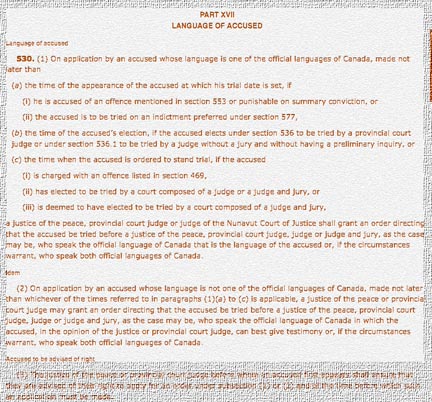The federal Crown
has been ordered to pay the costs of a lengthy preliminary hearing for a defendant in a cocaine trafficking trial because of numerous violations of the right to have a bilingual court proceeding.

The Ontario Court of Appeal also quashed the committal for trial ordered against Christian Munkonda by a provincial court judge in Ottawa nearly four years ago.
“Costs awards in a criminal case remain rare,” wrote Justice Paul Rouleau. “In this case the facts are indeed exceptional in many respects. The prosecution failed in several ways to respect the appellant’s language rights. Additionally, the treatment it afforded to the accused who exercised their right to have their preliminary hearing held in English was distinctly superior to the treatment if afforded to the accused who chose French,” Rouleau concluded.
The decision was released May 5 in both French and English by a panel with justices Robert Sharpe and Gladys Pardu concurring. Final decision on the exact cost order is still to come.
Munkonda was one of eight people charged in 2010 with offences related to allegations of cocaine trafficking. Six of the accused chose to be tried in English. Munkonda and another defendant, who was eventually discharged, chose to have their preliminary hearing in French.
The Criminal Code requires a judge to order that a proceeding be held in both of Canada’s official languages under certain circumstances, such as when there are two or more accused who speak either English or French. Section 530 of the code includes other requirements, such as a bilingual judge and prosecutor and that all court documents are in both official languages, including transcripts at the preliminary hearing.
“In conceptual terms, a bilingual trial or preliminary inquiry is a merger of a proceeding in French and a proceeding in English,” explained Rouleau. “To the extent possible and provided that it is reasonable, the language rights of each of the accused must be respected.”
Jean Richer, who represents Munkonda, says the ruling is very clear about the requirement to respect the statutory language rights of defendants.
“The court is sending a message. Stop ignoring these sections. They are mandatory,” says Richer, who adds that they are not “ideals” but provisions that must be followed.
Even the appeal was hampered by delays in obtaining transcripts in French, the Ottawa defence lawyer points out.
The Court of Appeal highlighted several examples where the bilingual requirements were not met during the 20-day-long preliminary hearing before Ontario Court Justice Robert Fournier.
More than one thousand conversations in four different languages were filed into the court record.
“All of the transcripts were in English, even where the conversation or text was in another language, because everything had been translated into English by the Crown. The original version of the texts of conversations in French was not included in the transcripts,” noted Rouleau.
Two of the three federal prosecutors, including the lead counsel, were not bilingual. The court reporter transcribing the testimony was unilingual English.
A francophone police officer from Montreal was questioned in English by one of the anglophone Crown attorneys, although he was ordered by Fournier to speak French when he was quoting from his notes.
The preliminary hearing judge denied a defence motion to replace two of the Crown attorneys and the court reporter, stating that he would like to do it in a “perfect world” but he did not want to avoid “undue delay” in the proceeding.
Munkonda was committed for trial on charges of trafficking and possession for the purpose of trafficking.
Superior Court Justice Robert Maranger agreed on a certiorari appeal that there were several violations of the defendant’s rights, but refused to stay the proceedings or award any remedy to Munkonda.
“The result was that no sanction was applied to the Crown for the violations of the appellant’s language rights,” wrote Rouleau.
The Court of Appeal also rejected the Crown’s suggestion that as long as one of the prosecutors in a proceeding is bilingual, that would be sufficient. As well, “in this case, the two unilingual prosecution counsel handled virtually the entire case,” said the court.
The Court of Appeal also criticized the preliminary hearing judge and said Fournier “bears a large share of the responsibility” for the failure to respect the rights of the defendant.
The Court of Appeal did not stay the charges but suggested that Munkonda might be successful if he seeks one in a lower court under s. 11(b) of the Charter for unreasonable delay.

 The Ontario Court of Appeal also quashed the committal for trial ordered against Christian Munkonda by a provincial court judge in Ottawa nearly four years ago.
The Ontario Court of Appeal also quashed the committal for trial ordered against Christian Munkonda by a provincial court judge in Ottawa nearly four years ago.